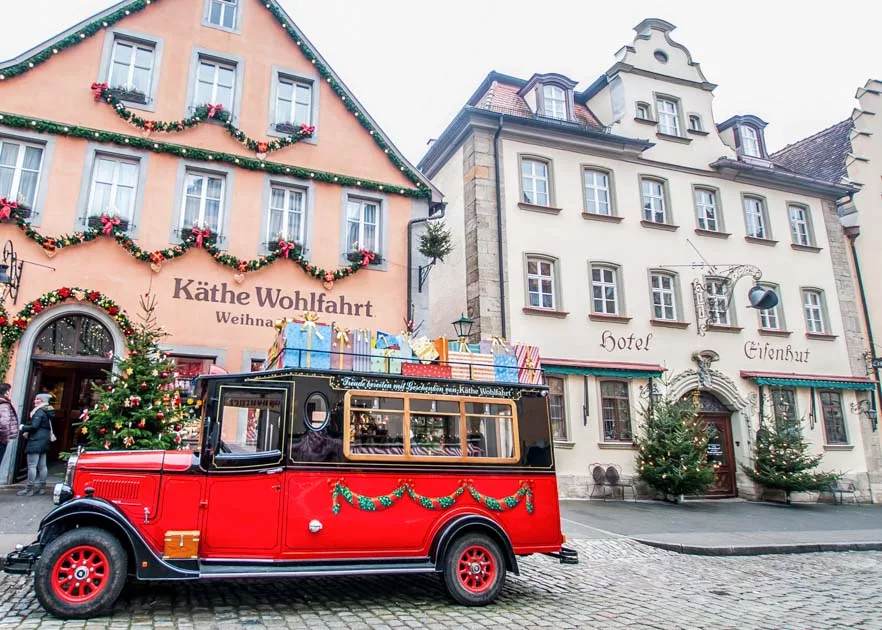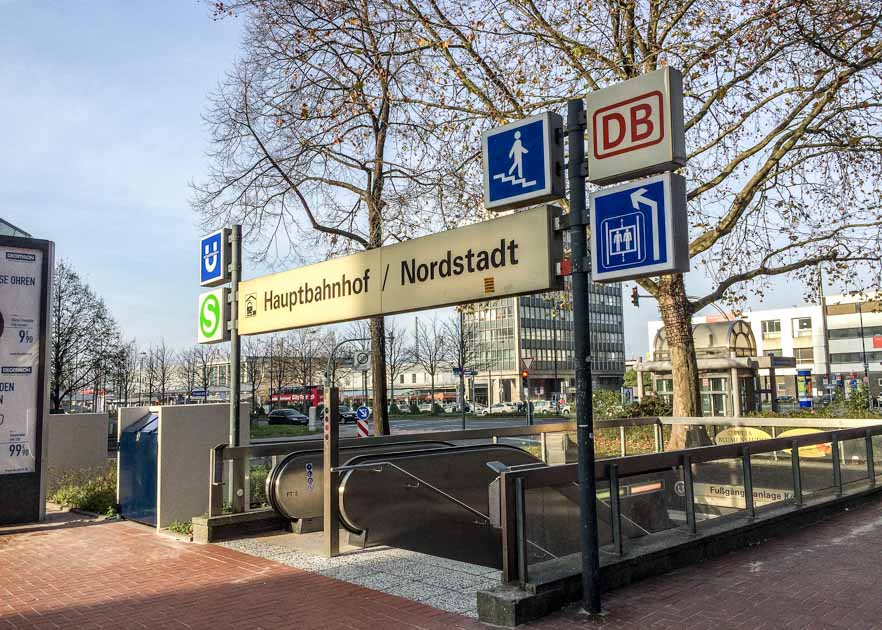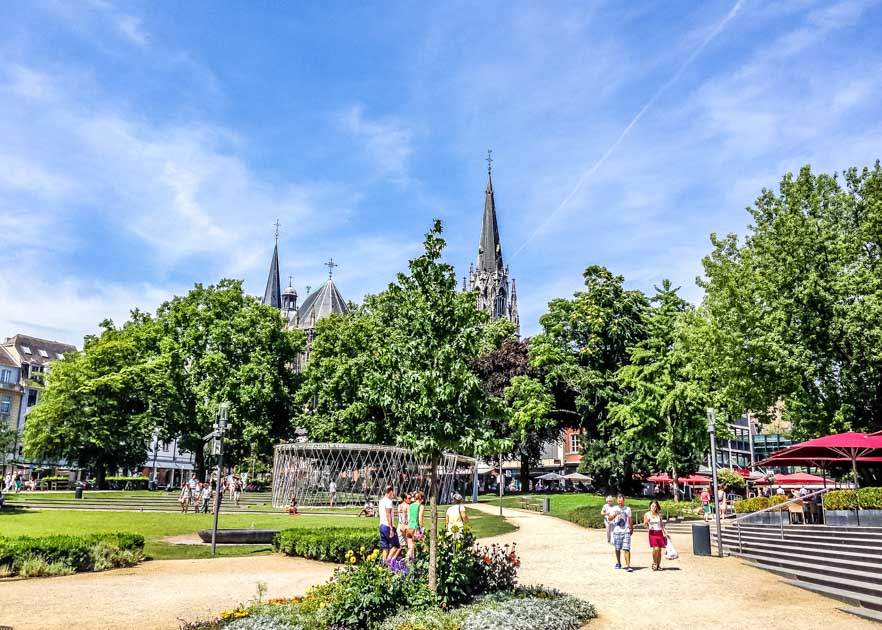Last Updated: August 4, 2025

Here are 20 essential things to know before visiting Germany—from key etiquette rules to practical tips that will help you travel with confidence, grace, and cultural respect.
Crucial German Etiquette
How to Visit Germany with Grace
Few countries feel both familiar and distinctly different to North Americans quite like Germany. At first glance, walking through a German city might feel like an ordinary day in Canada—albeit in one of our oldest, most historic towns. The architecture, the pace of life, even the storefronts may seem surprisingly recognizable—until you take a closer look and realize just how different the details truly are.
To which I earn a small commission, at zero cost to you!
Find more info in our Privacy Policy.
The people wear the same clothes, we eat the same foods (mostly), and we even listen to the same music. This is about where the similarities end. Our customs and etiquette standards are almost opposites, to the point where many Canadians/Americans have complained about visiting this great country.
It is easy to criticize a society we don’t know much about or have certain preconceived notions that don’t hold up once confronted with the real thing.
1. It’s all about the Cash
Not every place of business takes plastic. Even fewer accept credit cards as payment. It is always helpful to have cash in hand, just in case you run into a place that is cash only. Oh, they won’t tell you in advance, they don’t even have signs at the entrance. You just need to know.
Travel Tip: always have a few 1euro coins and 50Euro cent coins. You never know when you will need them. I have one of each stashed in a little pocket in my wallet. When I need it, it’s there.
2. You have to pay to pee
Speaking of change, just about every toilet you will use is going to cost you. It is generally 50 cents Euro but can go all the way up to 1 Euro per person. Children are allowed to enter with a parent free of charge but the change rooms for babies are often in the handicapped toilet and still require payment to access.
There are free options available, though I wouldn’t suggest using them outside of a restaurant. They can be “interesting”.

3. There is no Sunday shopping
Germany has very quiet, peaceful Sundays. Many locals from NRW travel to the Netherlands on Sundays for shopping. Luckily, the border is packed with great little towns just waiting for shoppers from the German border region to arrive. This has the expected consequence of making Saturdays in Germany a very busy shopping day for the unprepared. Sundays in the Netherlands are a great opportunity for shopping and other activities. This is why I prefer doing all of my shopping online, or just before I pick up the kids from school. That sacred 2-3 pm time at the grocery store is heaven…and the baby is napping in the stroller. Win-Win.
4. If a German says they will be there, they will be there.
Every year around my son’s birthday, I remember when he was turning 2 and we invited his whole class from preschool to his party. All 20 agreed to come, so I made snacks and cake for 20 kids and a parent. 3 showed up. And 2 of them were related. In Germany, when 20 people RSVP that they will be there, expect 20 people. German punctuality is also something to mention. Never be late for a German; traffic is not an excuse.
5. Germans stare.
Not like, staring at you until you make awkward eye contact then pretending nothing happened. They will stare at you, even after you notice and express your discomfort in it. I can’t tell if they are judging me, trying to figure out what I am saying, or some strange “lost in the moment” face and I happen to be in their line of sight, but it’s weird. I would say you get over it, but you really don’t.
6. We keep our voices down in public.
Germans like rules and they like it when everyone follows the rules. Part of these rules is keeping your voice down; no one wants to hear your conversation, and we don’t want anyone else hearing our conversation. Even the (local) children are aware of this rule. After living here for 4 years, we still stand out like the foreigners that we are. I can’t tell you how many times I have to shh the kids (to no avail) on a 10-minute bus ride, let alone a 45-minute tram ride to downtown.

7. Nudity is a thing.
Between the spa, beach, and swimming pools, I have seen way too much nudity. The changing rooms at the pool are communal family rooms, male rooms, and female rooms. And no one is shy about changing in front of strangers. Same with the showers after the pool. Speaking of the spa; a Spanish friend went to the spa with a few of her German girlfriends. They didn’t tell her anything because it is normal for them. She was mortified when she walked into the sauna and saw a bunch of naked old men lounging around. It got worse after she laid down and one of them walked up to her to talk about the flip-flops on the chair.
Nudity in the sauna is mandatory; they believe towels or swimsuits will lock in too much heat and damage your pores and overheat your body, and dirty towels are in the sauna are gross. We learned this the hard way when we went to the Tropical Islands. Fun times.

8. Never ask for tap water in a restaurant
On our very first night here, our waiter was so kind as to inform us of this social etiquette. While you may drink tap water at home, not everyone does. It’s seen as a faux pas. And therefore, restaurants will sell you a bottle of water. Even a pitcher of water with ice will cost a few euros. And be sure to ask for Still water. Germans like to carbonate their water and their juice. I mean, I guess water is pretty boring and those flavor infusion drops have a lot of sugar in them but seriously, carbonated apple juice?
9. Recycle, Recycle, Recycle
Back in the day, everything was taken back to the recycling depot and we were given a few bucks to spend at the candy store. Germany still has that and the depot is conveniently located at the entrance of most (if not all) grocery stores. When purchasing eligible items, we pay a deposit. In turn, we are encouraged to return that item for a refund. Most items start at 25 cents Euro and go up from there.
Many Germans prefer to return their items on a daily basis since they generally go to the store that often. I tend to forget mine and show up once a week with two large bags full of them. Again, more stares and comments. I don’t care – today’s groceries are free. I’m a winner.
There are some things that I just won’t return for a deposit, like my fancy Christmas market mugs. Sure, I COULD take a fun photo with them and pretend as I took it home. It would save me a ton of money and even more cabinet space. But where is the fun in that?

10. Avoid the bike lane.
We have ingrained this fact into our son and he is now schooling the little one. On most sidewalks, there are two lanes, a colored lane, and a grey lane. The colored lane is for bikes and the grey is for pedestrians. Cyclists will ring their little bell until you move out of the way; if they have to go around you, you will hear about it and everyone will know what you have done, see rules 5 & 6.
We learned this on our House Hunting Trip a few years ago. We almost got taken out by a line of bikers and a nice English-speaking couple (see, they are everywhere) informed us. I guess we looked like we had no idea what just happened. My son asked a good question the other day about it; if there are no signs, how do people know that these are the rules? I told him that moms and dads teach their kids, who go on to teach their kids… yes mummy but what about moms and dads that don’t know about the rules, who tells them? The bike that nearly hit you will be sure to educate you on the matter.

11. Germans don’t jaywalk (without getting yelled at).
Not a word of a lie, it doesn’t happen in Germany. I have been at this one intersection in town, not a car in sight for miles, and dozens of people are just standing on the curb – waiting for the light to change. They even get upset that it’s taking so long, but no one will dare step out into the road. The one or two people that will cross, get an ear full from both sides of the road.
Why? Mostly, because it’s against the law and Germans always follow the rules. But also because that jaywalker has set a bad example for the children around and could have been hurt. I have the right to go about my day without witnessing an avoidable tragedy.
This has a lot to do with the driving laws in Germany too; Cars generally have the right of way in all cases except when a crosswalk is present ( but even like North America, many drivers view them as suggestions instead of laws), followed by bikes, dogs, then pedestrians. That’s right, dogs have socially more rights than a pedestrian.
When it comes time to cross on a small street, cars rarely slow down to let anyone pass before they make their turn. We learned this rule VERY QUICKLY.
While not totally related, this does come to mind every time I hear the term Jaywalking
12. Speaking English hasn’t made its way up the ranks just yet
The random lady walking her dog can speak to my kids, my neighbor is a SAHM and she can speak perfect English. So can the butcher, the cashier, and the nice lady that serves me at Subway even has an American accent. But my Realtor, Bank Teller, or Cell Phone retention department… not a single word.
I mean, yes, this is Germany and English isn’t even an official language so I can’t exactly EXPECT anyone to speak English. But when the guy at McDonald’s has a second language but the guy robbing me blind at Vodafone can’t string two sentences together, I start to question things.
The moral is, to try to learn a few words. Those that can’t speak English though, seem to have a bit of a chip on their shoulder about it and refuse to hear your broken German no matter how hard you try. I have had a few altercations with the staff because I am trying to say the few German words that I know and they just stare at me like I was from another planet. A nice customer from behind would interrupt, tell me what was going on, tell the staff what I am trying to say, then proceed to chew them out for being so ignorant about my accent.
13. They will scold your kids for you
True story, Germans are not afraid of Mamma bear. If your kid is out of line, they will correct the child and the child better listen respectfully. On the other hand, if you are busy chatting with the neighbors and your kid gets an earful from grandma across the park, just take it and move on. It’s nothing personal, and she probably has her best intentions at heart. This has a lot to do with the level of freedom Germans give their kids.
14. Kids roam free and respectfully at a very young age
The main reason I can think of why strangers discipline “school” children is a result of the amount of freedom that children are given in Germany. As young as 6 years old, kids are allowed to ride the train on their own, walk to school by themselves, go to the store, and run errands for mom and dad. Because they are allowed in public without supervision, the general public is in charge of that child’s well-being. It takes a village, after all. As a parent, Germans know that strangers will care for the child should they need help, and in return, parents help other children they see walking alone (or not alone, they don’t really care).
15. Tax is included in the price
Gone are the days of factoring in 14% sales tax on some items, but not on others. Or wondering what is the tax rate in this province/state. It is the law that all price tags show the final price of an item. Kids can now properly budget for their sweeties.

16. German grocery stores
What the cashiers lack in patience, they make up for in speed. Not only am I required to bring my own bag (plastic bags are for sale, but they aren’t cheap), and bag my own groceries, these people never let up. I could be drowning in a sea of vegetables and they will keep piling it on until there is no room left on the counter… then wait and stare as I frantically throw everything into my buggy so she can scan more items. And of course, they are done scanning well before I am done putting food away, so what do I do?
Do I pay now and finish packing after, or do I finish packing and pay after? Either way, everyone is staring and checking to see if I will break under the pressure.
It’s a sport, it has to be. Even the locals look flustered when it’s their turn. I am convinced this is why they all have small fridges; so they have to shop more often, meaning they have smaller loads in their carts, and can easily keep up with the cashier.
17. Expect to share and make new friends
Just like the cafeteria in high school, Biergartens and other public spaces have a lack of seating and this can only lead to one thing… sharing. The benches are long enough to accommodate many people and Germans may not ask permission to sit with you. If there is space, they will come. If you are taking up too much room, they will ask you to move over to make way for the rest of the group. No one is shy in Germany.
Now, this doesn’t mean you actually have to talk to them. As I said before, Germans aren’t really into small talk, so if you aren’t interesting to them, they will leave you alone. But if you say or do something to pique their interest, be prepared to make a new friend because they will start talking to you.
18. Drinking in public isn’t just for the Biergarten
It is legal to drink just about anywhere in a public space. This makes Christmas Markets and the downtown area a great place to be during festivals. You are allowed to drink in public, this doesn’t mean you can be drunk in public. Know your limit and don’t embarrass yourself.
The surrounding countries, however, don’t have the same love for beer.
We went to Rotterdam for a quick weekend break and saw a guy drinking his beer outside the train station. To me, it wasn’t a problem, I’ve been in Germany for 4 years, it’s normal. Nope. A nice man politely asked him if he was German, and the answer was yes. “Well, here in the Netherlands you are not allowed to drink in public. I suggest you put it away until you are back in the hotel”.
Oops. Another great story; we were walking around downtown and saw a Panel Van pull up at a stop sign. A bunch of construction workers jumped into the van, with a beer in hand, and they drove off. Drinking while in a car is legal.
Driving while drunk or drinking while driving the car is not legal, however. The legal limit is .05% (to compare, it is .08% in America). The fines are much higher, you can lose your license on the first offence and may also be required to see a psychologist for evaluation of your ability to drive in the future. With this much beer available, and so ingrained in their culture, it is no wonder that strict rules are made.
19. Autobahn is German for Highway
Germany is not the magic land of high speeds and NASCAR practice. There are speed signs on many parts of the highway. There just also happens to be many parts, safe parts, that are unlimited. This means the roads are straight and uneventful enough to make driving 200km/hr relatively safe. But whatever you do, do not go into the Left lane if you aren’t prepared to join them. Cars will come up at you so incredibly quickly that you won’t know what is going on. Rarely will they slow down, mostly because they don’t have to. It’s like a game of chicken except everyone knows that the slowpoke is at fault. Keep up or get out.

20. They aren’t rude, they are just German.
So this has come up a few times. Germans, in general, are very frank. They aren’t interested in pleasantries; they have things to do. Germans tend to be more direct and expressive which can come off as a little aggressive to non-Germans.
This can come off as rude in terms of customer service, the way they talk to you in the streets, even the way they scold you and your kids (adults are not immune to being told off). I promise you, they aren’t being rude. Some would even say our exaggerated concern with politeness is exhausting and time-consuming.
Your Thoughts...
Please share your thoughts in the comments or reach out on social media...We would love to hear from you.
You May Also Like…
10 things I will and won’t miss about Germany
A Day in the Life: Living in Germany
Toughest Things About Traveling in Europe with Kids


